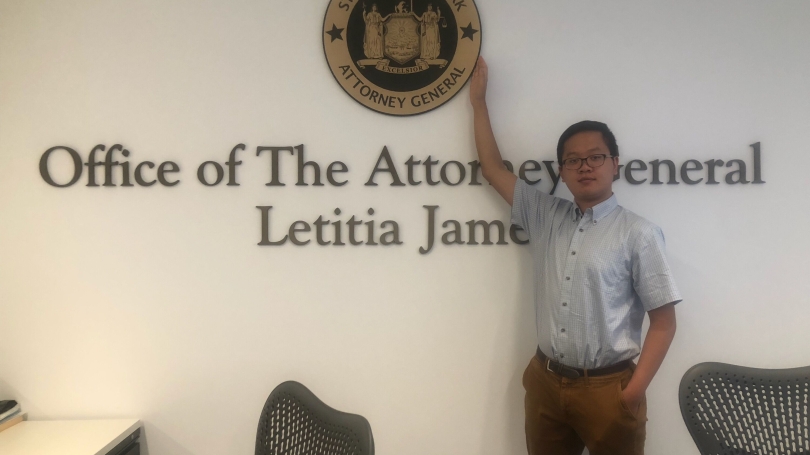
- Public Policy
- Leadership
- Funding
- News & Events
- About the Center
Back to Top Nav
Back to Top Nav
Back to Top Nav
Back to Top Nav
Zhihao Wang '22 interned at the New York State Office of the Attorney General during the 2019 summer term.
During the summer of 2019, I interned for the New York State Office of the Attorney General. The New York Attorney General functions as both the state’s highest law enforcement officer and the state’s chief legal counsel. The office is an elected position; the current Attorney General is Letitia James. With over 600 attorneys and 1700 employees, the Attorney General’s office covers a broad range of litigation in areas ranging from welfare fraud to cybersecurity. The New York Attorney General can also cooperate with the Attorney Generals of other states. The New York Attorney General has led multistate lawsuits in issues concerning the opioids epidemic, the citizenship question on the US Census, and the Equifax cyber breach.
At the Attorney General’s Office, I worked within the Labor Bureau. The Labor Bureau’s overall mission is to enforce labor laws and regulations in the state of New York; the bureau is composed of attorneys with expertise in fields ranging from unemployment insurance to minimum wage regulations. During the summer of 2019, I worked as the bureau’s Data Analysis and Research Intern. My work entailed using quantitative methods to support ongoing investigations. For example, one of my projects required me to develop a program that distributed a multimillion-dollar settlement to employees who had worked at a TV production firm that had failed to pay its employees overtime wages. I also used Microsoft Excel to examine discrepancies in payroll records for a firm accused of avoiding payroll taxes. Microsoft Excel is a program used very widely throughout the professional world. I learned a number of important commands and learned how to write complicated formulas in the program. At the same time, I had the opportunity to network with a number of data scientists working at the Attorney General’s office and better understand how data science is used in law. For example, I talked with several attorneys who explained how data science was used to track the distribution of opioids and was being used in the ongoing litigation against numerous pharmaceutical companies.
Beyond using quantitative methods to assist in ongoing investigations, I also had the opportunity to learn about the careers of attorneys working at the Labor Bureau, many of whom had prior experience in District Attorney offices, major law firms, administrative courts and federal courts. Overall, my internship helped to broaden my perspective on careers available within the field of law. The internship helped me better understand the work of public sector attorneys, particularly among prosecutors. The projects I worked on also helped me develop familiarity with a number of widely used programs, particularly Microsoft Excel. By understanding how to communicate effectively, I was able to better assist them when providing guidance. Thus, I would like to thank the Rockefeller Center for their generous role in making this internship a possibility.
The Rockefeller Internships Program has funding for Dartmouth undergraduate students to help defray the cost of living expenses associated with a full-time, unpaid, leave-term internships in the fields of public policy, public affairs, and social entrepreneurship.